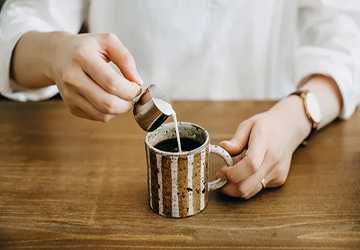How To Make A Perfect Cup Of Coffee
Welcome to the world of perfect coffee, where every sip is an artistic journey to create the ideal coffee. If you've ever been frustrated because your morning coffee didn't live up to expectations, you're not alone. But don't worry - in this guide, you'll learn everything you need to know about making the perfect cup of coffee. No fancy gadgets or complicated theories are required, just simple but essential ideas to make your coffee routine a daily pleasure. Grab your favourite container now and discover the tips for preparing the ideal cup of espresso.

Choosing high-quality coffee beans: the foundation of high-quality coffee
Imagine building a house on a crumbling foundation – not a good idea, right? The same goes for coffee. You're already halfway to coffee heaven, starting with quality coffee beans. Look for fresh beans, preferably whole, and ensure they are in their best condition. Consider the baking date – the closer to the current date, the better. Avoid pre-ground espresso; cracking the beans before brewing maximizes the flavour of the beans. Investing in a grain mill is innovative because it ensures consistent grinding, essential for smooth extraction.
Perfect Grind: One size does not fit all.
Grinding coffee beans is like choosing the right gear for your bike - it's all about finding the perfect fit. Different brewing methods require different grind levels, a common mistake many coffee lovers make. Choose a medium grind for a traditional espresso machine; it shouldn't be too fine or thick. A very coarse grind is highly recommended if you prefer a French press. The espresso must be ground to a reasonable level, like powdered sugar. Since consistency is key, experiment with grinding until you find the ideal setting for your preferred brewing technique.
Water Matters: The Unsung Hero of Your Coffee
Let's consider the importance of water. Since most espresso shots are made of water, choosing the proper water can significantly affect the quality of your coffee. Forget about using tap water straight from the tap; it may contain unwanted minerals or impurities that will affect the taste of your coffee. Choose filtered water. It's a simple switch that can make a big difference. For best extraction results, lower the boiling point of water to below approximately 200°F (93°C). If your espresso is too hot, you risk burning it. If it's too cold, the entire flavour will be lost.
Brewing Times and Conditions: Finding the Goldilocks Zone
Now that you have excellent coffee beans, the perfect grind, and top-notch water, it's time to brew. Brewing time and coffee-to-water ratio are the final pieces of the puzzle. It's like cooking - too much of an ingredient or too little time on the stove, and you'll be disappointed. The usual ratio for drip caffeine is one to two teaspoons of espresso per six cups of water. Adjust the strength to your taste; make it milder or harsher. Also, pay attention to the brewing time. Too short and your coffee may not taste great; too long and it may become bitter. Experiment with these variables until you find your personal Goldilocks zone. Remember: Making the perfect cup of coffee is an art, not an exact science.
Pay attention to the brewing temperature: not too hot or cold.
You'd be surprised how often your brewery's temperature needs to be monitored. Cappuccino is a delicate drink; it needs the right temperature for its flavour. Over-extraction using too hot water can cause the beer to be too bitter. However, if it's too cold, you won't be able to experience the full flavour. Investing in a simple kitchen thermometer can be a game changer. Aim for a heating temperature of around 200°F (93°C) for drip espresso. Let the hot water cool slightly before pouring it over the bean flour if you're using a familiar technique. Consistency is crucial. So, keep an eye on the temperature to ensure consistent, high-quality coffee every time.

Freshness is Key: Store Your Beans Carefully
Imagine baking a cake with stale flour - it won't taste the same. The same goes for coffee beans. Freshness is the secret. If you purchase high-quality coffee beans, store them properly to preserve their flavour—store beans in an airtight container away from sunlight and moisture. Avoid storing coffee beans in the refrigerator or freezer because coffee beans are porous and can absorb odours. Buying coffee in bulk is tempting, but if you're looking for perfection, purchase small amounts more often. This ensures you always use the freshest beans and gives your coffee a unique flavour.
The Right Water to Coffee Ratio: A Balanced Act
Achieving the proper water-to-caffeine ratio requires skill. Too much coffee will overwhelm your cup, while too little will lack that rich flavour. Your brewing technique and personal taste preferences determine the best ratio. Increase the amount of coffee grounds for a more robust cup; use less grounds for a milder experience. A reasonable starting ratio for making espresso is about 1:15 (1 part coffee beans to 15 parts water). Adjust as necessary to suit your taste; feel free to try different combinations until you find your ideal harmony.
Water Quality Experiment: Beyond Filtration
While using filtered water is a good start, improving water quality can improve your coffee experience—some espresso connoisseurs swear by using sparkling water to enhance the taste. The mineral content in the water can add subtle nuances to the flavour, creating a rounder, more enjoyable coffee. Try different types of water to see which works best for your choice of coffee beans. Next time you go to the store, grab a few bottles of varying water brands and see which one takes your coffee to the next level.
Conclusion
Revel in the satisfaction of a task accomplished as you sip the last drop of your expertly brewed coffee. Making the perfect cup of coffee requires constant exploration, and with these eight detailed ideas, you'll equip yourself with the knowledge you need to overcome any coffee challenge. From choosing high-quality coffee beans to mastering the water-to-coffee ratio, every step is crucial to a better coffee experience. So embrace the simplicity, enjoy the process, and be happy that you are now a coffee mug master. You are wishing you many more perfect cups in the future.